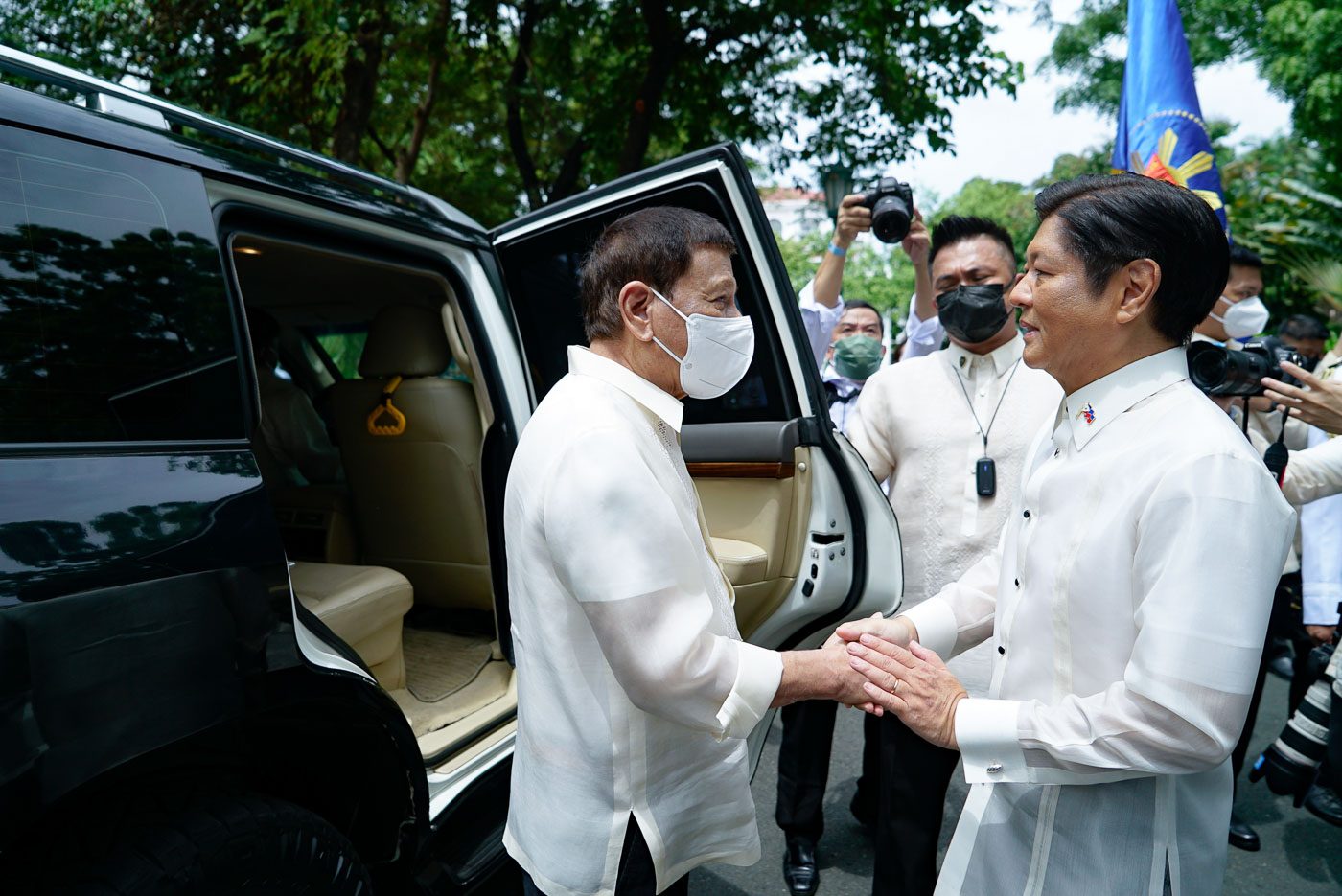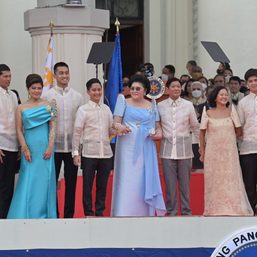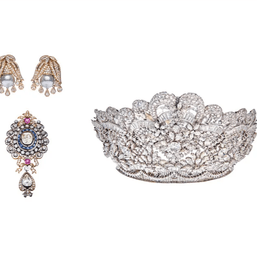SUMMARY
This is AI generated summarization, which may have errors. For context, always refer to the full article.

MANILA, Philippines – In November of 2021, the Marcos-Duterte tandem was more than just a vehicle for the 2022 presidential elections.
Public surveys would affirm what operators and interlocutors from all sides long knew: a Ferdinand Marcos Jr. and Sara Duterte tandem was an almost-sure ticket to Malacañang for the dictator’s son, and potentially another ticket, too, for the golden child of the strongman from Davao.
But as easy as Marcos and Duterte – children of notorious strongmen in Philippine politics – strode to victory, so did cracks in their union emerge.
The slow-burning tensions and micro fissures in the union came to a head on January 28, the last Sunday of a month that felt and seemed endless.
In Manila, before a crowd of government workers and his supporters, the dictator’s son and namesake spoke of a “Bagong Pilipinas” (literally, a new Philippines).
Miles away in Davao, before a smaller crowd supposedly from all over the country, former president Rodrigo Duterte went on another of his trademark late night tirades, accusing Marcos of being a drug addict.
With one of the tickets to Malacañang already spent, the dream team was apparently no more.
Allies, not friends
Unlike most presidential and vice presidential tandems in recent Philippine history, the younger Marcos and his vice president had no real personal ties to speak of. People privy to their interactions off-stage and off-camera during the campaign often characterized their relationship as “okay” – but never enough to call it a friendship.
Theirs was a campaign considerably less hectic than most – a handful of rallies sandwiched motorcades and days without public campaign activities for both candidates. In the final stretch of the campaign, perhaps in response to the huge crowds that Marcos’ chief rival, former vice president Leni Robredo, drew, the Marcos-Duterte “Uniteam” made it a point to also emphasize the mammoth crowds they were attracting.
There was neither space nor motivation to go the extra mile – after all, they were miles ahead in the polls.
Marcos has a long, although lackluster political track record: vice governor, then governor while his father was dictator, legislator during their family’s comeback to politics, Ilocos Norte governor again, district representative again, until he finally entered the national scene with a Senate seat. After losing the 2016 vice presidential race, Marcos would disappear from politics but reemerge on social media as a vlogger. His next public post would be president.
Sara Duterte, meanwhile, spent all her political life in Davao – first running as vice mayor to Mayor Rody in 2007. When he hit the term limit for mayor, Sara stepped in as the city’s chief executive, during which time she infamously punched a sheriff. When he left Davao to seek the top seat in Malacañang, Sara again took over city hall.
But the two kept it chummy – at least chummy enough – during and even after the campaign, interacting casually on stage and releasing vlogs that showed the “lighter” side of the 2022 juggernaut that held the Uniteam together.
Curiously, still, it was with another Marcos that Sara Duterte had actual, personal ties – Senator Imee Marcos, the dictator’s eldest daughter and the President’s manang or elder sister. The two presidential daughters even appeared in an ad together in 2019, when Imee was seeking a Senate seat.
Senator Marcos, however, has remained an outsider in her ading’s (younger sibling’s) Malacañang. She’s taken a pseudo-opposition stance under her brother’s administration – criticizing its policies and actions, and promising she’d remain an ally of the Dutertes amid conflict between the Davao-based clan and her cousin, House Speaker Martin Romualdez.
Another woman political power player also binds the two clans: Gloria Macagapal-Arroyo.
Arroyo’s power, however, has been clipped in the past year, after being touted by Marcos himself as his “secret weapon” in his foreign visits.
The Duterte dynasty
It was the fall of one patriarch that led to the rise of the other – Rodrigo Duterte first entered politics in the aftermath of the People Power Revolution that ousted the Marcos clan from Malacañang.
The late Corazon Aquino had wanted Rodrigo’s mother Soledad Duterte, a leading Davao anti-Marcos activist back then, to be interim vice mayor of Davao City. Then 70 years old, Soledad begged off and offered her son Rodrigo as vice mayor instead.
While his mother is most remembered for helping organize the anti-Marcos groups and leading the Yellow Friday Movement in Davao towards the end of the dictatorship, Rodrigo’s father and Vice President Sara Duterte’s grandfather, Vicente Duterte, is remembered for his political career.
Vicente was mayor of Danao in Cebu, then became governor of a unified Davao province, after which he became a member of Ferdinand E. Marcos’ Cabinet.
In 1966, Vicente vacated his gubernatorial seat in the middle of his second term because he was appointed Marcos’ Secretary of General Services or head of the government’s central procurement agency.
Rodrigo’s sister, the late Jocelyn Duterte, had interactions with former first lady Imelda Marcos, mother of the current President.
In Duterte’s biography, Beyond Will & Power, author Earl Parreño wrote: “It was the first year of Ferdinand Marcos’ presidency and Imelda was avidly working on her own projects as his First Lady. One of her projects was hosting a debut for the daughters of her husband’s cabinet members and senior officials, who were turning or had just turned 18 that year.”
Jocelyn, a self-admitted probinsiyana, felt out of place in the glitzy event, she told Parreño in the book. Rodrigo accompanied Jocelyn and another brother, Emmanuel, to debut rehearsals in Malacañang, but “didn’t want to stay long.”
Rodrigo Duterte would display the same disdain for frivolity as Davao mayor and later, as Malacañang’s chief resident.
Former president Duterte has made no secret of his admiration for the man his father once worked for and whom his mother bravely stood up against. During his proclamation rally in 2016, Duterte characterized the elder Marcos as the “best president,” if not for his “long” stay as the nation’s top leader.
The senior Marcos first won the presidency in 1965 and was reelected four years later (the 1935 Constitution, as amended, allowed two four-year terms as president and vice president). In 1972, Marcos placed the country under Martial Law and while it was lifted nine years later, human rights abuses and the theft of public funds remained rampant.
Economics and human rights experts consider the dictator Marcos’ decades-long hold on power among the darkest days of Philippine democracy. Duterte said he admired Marcos’ agricultural programs.
Rodrigo Duterte, however, did not seem to have the same high regard for the dictator’s only son and namesake.
Old man Duterte vs Marcos Jr.
From the day the Uniteam was announced until the last day of the official campaign period, Duterte did not endorse his daughter’s Uniteam standard-bearer, even as his allies and his own party eventually succumbed to the shoo-in for the 2022 presidential race.
It was not surprising at all.
Rodrigo Duterte, after all, had been incensed over daughter Sara’s decision to settle for vice president even if she had led early preference polls for president. The former president, in a November 2021 interview with a pro-Duterte radio host, blamed the Marcos camp for the decision.
He also claimed that Marcos and his wife, Marie Louise “Liza” Araneta Marcos, had visited him in Malacañang before presidential candidacies were announced. The former president said he thumbed down Bongbong Marcos because he was “pro-communist.” Liza Marcos, now First Lady, was also subjected to Duterte’s ire during that January 2024 Davao prayer rally.
Days later, still in November 2021, Duterte alluded to a presidential aspirant who uses cocaine, and is a “weak leader” who had nothing but his father’s name to boast of. Duterte did not say who he was alluding to, but said the candidate might win the 2022 polls “hands-down.” Imee Marcos said the clan was “absolutely heartbroken” over Duterte’s remarks.
Despite the lack of an endorsement, Marcos, the presidential candidate, made vague promises of continuing what the Duterte administration had started.
The year-and-a-half-old Marcos administration, thus far, hasn’t exactly been a continuation of Duterte’s six years – Marcos vowed a “slightly different” drug war, released long-time Duterte critic former senator Leila de Lima, and has taken a 180-degree turn in the Philippines’ foreign policy, to name a few.
Under Marcos, Manila has grown much closer to Washington DC, while also strengthening ties with existing and new partners. Its relationship with Beijing – one that Duterte fostered – has festered and turned cold. Philippines-Chinese bilateral ties are a “crossroads,” according to Chinese Foreign Minister Wang Yi.
A familiar Duterte reemerged Sunday evening, January 29.
Surrounded by a crowd lit by candles, the former president accused the Marcos clan of wanting to stay in power beyond the prescribed term limit, ranted about the International Criminal Court case against him, and claimed the President was a “drug addict.”
His son, a tattooed surfer who now heads city hall, called on Marcos to resign if he did not have “love and aspirations for your country.”
Marcos retorted by blaming the older Duterte’s tirades on his use of the highly-addictive fentanyl.
Meanwhile, Sara Duterte remains a member of the Marcos Cabinet. In a statement on January 29, she said she did not speak to her mayor-brother about his call for the President to resign. She also has not addressed her father’s allegations.
After long twists and turns in their family histories – and the occasional intersections of their paths – another, more infamous Duterte finds himself at an odd position: leading the charge against his successor Ferdinand Marcos Jr. – Rappler.com
1 comment
How does this make you feel?
![[In This Economy] Marcos’ POGO ban is popular, but will it work?](https://www.rappler.com/tachyon/2024/07/thought-leaders-marcos-pogo-ban.jpg?resize=257%2C257&crop=255px%2C0px%2C720px%2C720px)
![[Rappler Investigates] POGOs no-go as Typhoon Carina exits](https://www.rappler.com/tachyon/2024/07/newsletter-graphics-carina-pogo.jpg?resize=257%2C257&crop=424px%2C0px%2C1080px%2C1080px)




![[WATCH] In the Public Square with John Nery: The Marcoses’ three-body problem](https://www.rappler.com/tachyon/2024/04/pubsq-sq.jpg?resize=257%2C257&crop=390px%2C0px%2C1080px%2C1080px)
![[Newsstand] The Marcoses’ three-body problem](https://www.rappler.com/tachyon/2024/04/tl-marcoses-3-body-problem.jpg?resize=257%2C257&crop=451px%2C0px%2C1080px%2C1080px)
![[EDITORIAL] Kalaban mo ang mga senador na protektor ni Quiboloy](https://www.rappler.com/tachyon/2024/03/animated-quiboloy-kojc-senate-carousel.jpg?resize=257%2C257&crop=365px%2C0px%2C720px%2C720px)




![[OPINION] If it’s Tuesday it must be Belgium – travels make over the Marcos image](https://www.rappler.com/tachyon/2024/04/tl-travel-makeovers-marcos-image.jpg?resize=257%2C257&crop_strategy=attention)

![[OPINION] Rodrigo Duterte and his ‘unconditional love’ for China](https://www.rappler.com/tachyon/2024/04/rodrigo-duterte-xi-jinping-august-2019.jpeg?resize=257%2C257&crop=91px%2C0px%2C900px%2C900px)



![[The Slingshot] Lito Patay’s 4 hours and 38 minutes of infamy](https://www.rappler.com/tachyon/2024/07/Lito-Patay-4-hours-infamy-July-19-2024.jpg?resize=257%2C257&crop=233px%2C0px%2C720px%2C720px)




![[Rappler’s Best] Knowing when to leave](https://www.rappler.com/tachyon/2024/07/biden-sara-gfx.jpg?resize=257%2C257&crop_strategy=attention)
The developments of this contest between two political dynasties are worth following. Last Sunday, such a contest finally became a “word” war. Will this conflict continue? If it will continue, until what level? How will it end? Who will benefit and be disadvantaged from this? This battle between two strong Political Dynasties is indeed worth following up on.